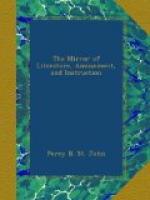and oft they have broken my shins. I would not
either object to sofas and ottomans, in any reasonable
proportion; but protest I must, and in the strongest
terms too, against such a multiplication and variety
of easy chairs, as effectually exclude the possibility
of easy sitting; and against the overweening increase
of spider-tables, that interferes with rectilinear
progression. An harp mounted on a sounding-board,
which is a stumbling-block to the feet of the short-sighted,
is, I concede, an absolute necessity; and a piano-forte,
like a coffin, should occupy the centre even of the
smallest given drawing-room—“the
court awards it, and the law doth give it,”—but
why multiply footstools, till there is no taking a
single step in safety? An Indian cabinet also,
or a buhl armoire, are, either, or both of them, very
fit and becoming; but it cannot be right to make a
broker’s shop of your best apartment. An
ink-stand, as large as a show twelfth-cake, is just
and lawful; ditto, an ornamental escrutoire; and a
necessaire for the work-table is, if there
be meaning in language, perfectly necessary.
These, with an adequate contingent of musical snuff-boxes,
or molu clocks, China figures, alabaster vases
and flower-pots, together with a discreet superfluity
of cut-paper nondescripts, albums, screens, toys,
prints, caricatures, duodecimo classics, new novels
and souvenirs, to cut a dash, and litter the tables,
must be allowed to the taste and refinement of the
times. But surely some space should be left for
depositing a coffee-cup, or laying down a useful volume,
when the hand may require to be relieved from its
weight, or when it is proper to take a pinch of snuff,
or agreeable to wipe one’s forehead. Josses,
beakers, and Sevres’ vases have unquestionably
the entree into a genteel apartment; but they
are not entitled to a monopoly of the locale;
nor are Roman antiquities, or statues even by Canova,
justifiable in usurping the elbow-room of living men
and women. Most unfortunately for myself, I have
a very small house, and a wife of the most enlarged
taste; and the disproportion between these blessings
is so great, that I cannot move without the risk of
a heavy pecuniary loss by breakage, and a heavier
personal affliction in perpetual imputations of awkwardness.
Then, again, it is no easy matter to put on a smiling
and indifferent countenance, whenever a friend, accustomed
to some latitude of motion, runs, as is often the
case, his devastating chair against a high-priced
work of art, or overturns a table laden with an “infinite
thing” in costly bijouterie. I have
long made it a rule to exclude from my visiting-list,
or at least not to let up stairs, ladies who pay their
morning calls with a retinue of children: but
the thing is not always possible; and one urchin with
his whip will destroy more in half an hour, than the
worth of a month’s average domestic expenditure.
Oh! how I hate the little fidgeting, fingering, dislocating
imps! A bull in a china-shop is innocuous to
the most orderly and amenable of them. Why did
Providence make children? and why does not some wise
Draconic law banish them for ever to the nursery?




